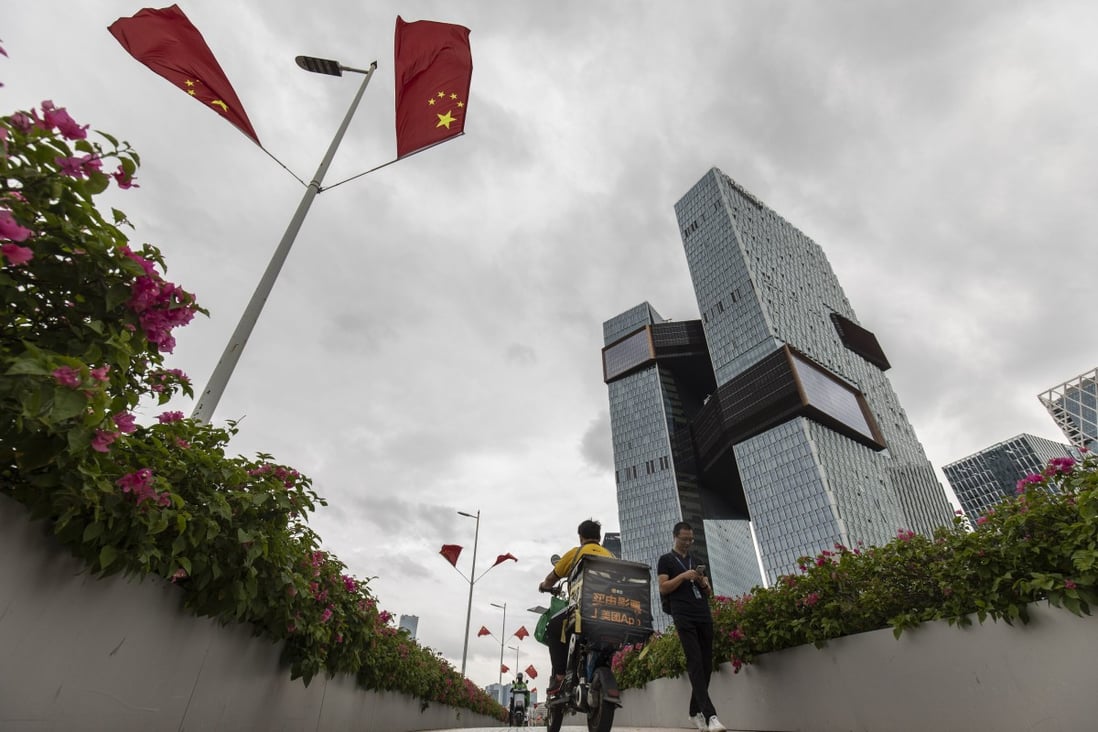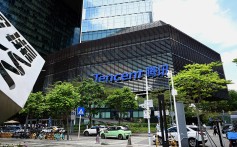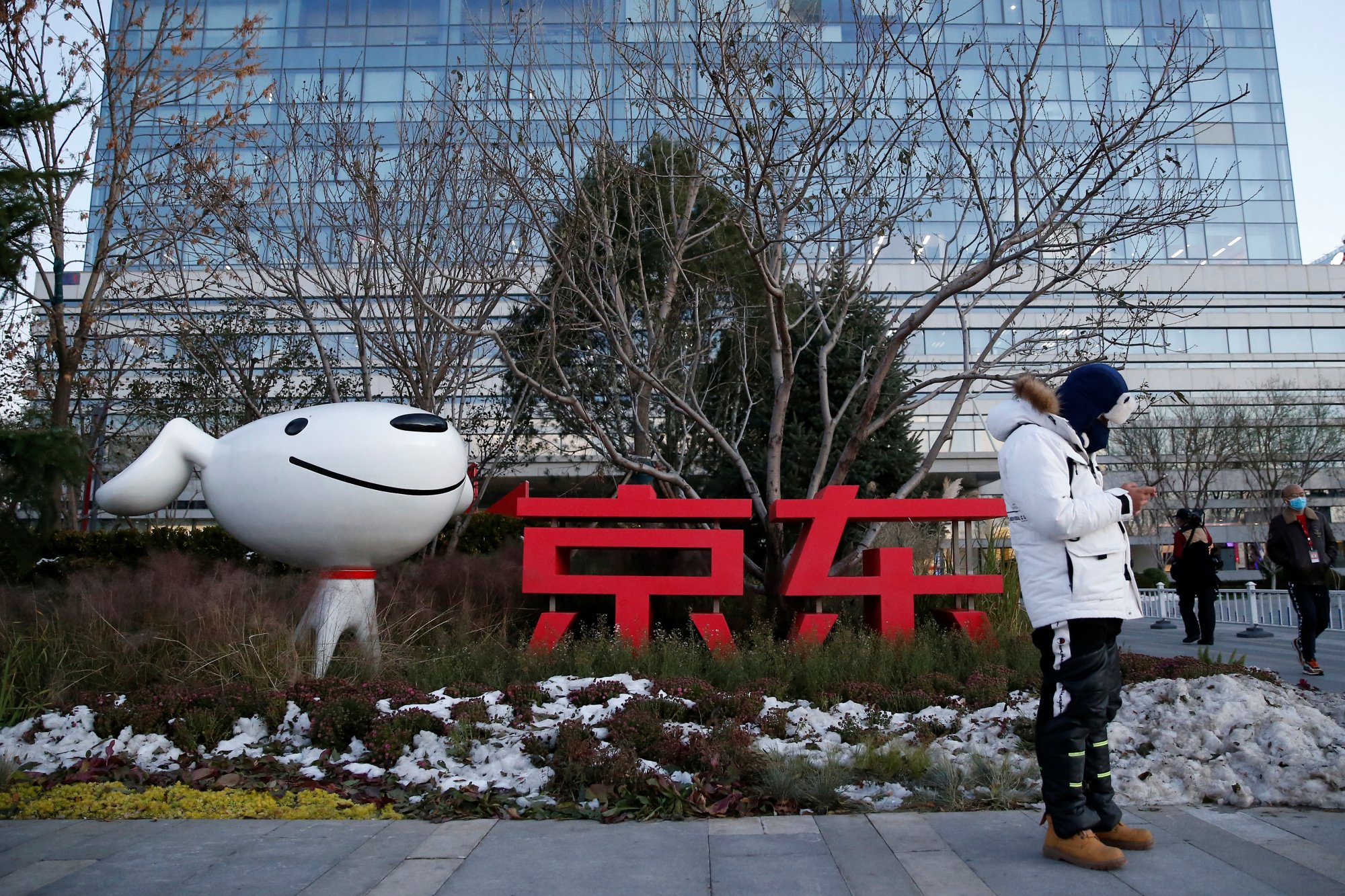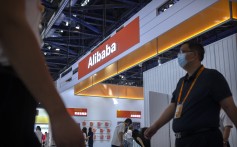The market value of JD.com shares to be transferred is estimated at US$16 billion, according to a Tencent statement issued on Tuesday
Tencent is under pressure to be a neutral infrastructure service provider amid Beijing’s push for interconnectivity, forcing it to open its ecosystem to JD.com’s rivals
Iris Dengand Jane Zhang
23 Dec, 2021

Tencent headquarters in Shenzhen, China. The company is divesting its investment in JD.com under antitrust pressure from Beijing. Photo: Bloomberg
Tencent Holdings said it would distribute most of its shares in JD.com as a special dividend to investors, as China’s dominant social media network made a surprise move to pare back its stake in the country’s second-largest e-commerce platform in response to Beijing’s antitrust demands.
The market value of JD.com shares to be transferred is estimated at HK$127.7 billion (US$16.37 billion), according to a Tencent statement issued on Thursday. Shenzhen-based Tencent, previously the biggest shareholder in JD.com, will see its stake in the company fall to 2.3 per cent from 17 per cent after the transfer.
Tencent president Martin Lau Chi-Ping has stepped down from JD.com’s board, effective immediately.
Tencent said in the statement that its strategy was to “exit the investments [where appropriate] as the investees become consistently capable of self-financing their future initiatives,” adding that JD.com has now reached that position.
Tencent is looking for return on its investments as its portfolio gets bigger, and JD.com was one of the self-sufficient companies that the internet giant has helped grow, according to a company source who declined to be named.
The divestment will not affect its strategic collaboration with JD.com in areas such as online payments and advertising, and Tencent has no similar plan for its other investee companies, the person said.
Tencent ramps up legal battle against ByteDance over popular anime
22 Dec 2021

The sale will leave JD.com founder Richard Liu Qiangdong and Walmart as the e-commerce company’s biggest shareholders, with 13.9 per cent and 9.3 per cent stakes, respectively, based on its latest annual report.
“Divesting the bulk of its interest in JD could be interpreted as a move to enable greater and fairer competition among e-commerce platforms on WeChat, rather than the previous situation that gave Tencent investees favourable treatment vs. Alibaba’s services,” said Bloomberg Intelligence analyst Matthew Kanterman.
Tencent first invested in JD.com in 2014, after it decided to retreat from a head-on battle with China’s No 1 e-commerce player Alibaba Group Holding, owner of the South China Morning Post.
At the time, Tencent acquired a 15 per cent stake in JD.com, which took over the operations of its own e-commerce platforms QQ Wanggou and PaiPai.
Their ties grew closer as competition with Alibaba intensified, prompting Tencent to raise its stake in JD.com in 2019 and 2020.

A man stands outside JD.com’s headquarters in Beijing, China, November 9, 2021.
Photo: Reuters
In turn, JD.com’s alliance with Tencent gave it access to WeChat, China’s dominant super app where users chat, work and shop.
However, Tencent is coming under pressure to be neutral as an infrastructure service provider amid Beijing’s push for interconnectivity, forcing the company to open its ecosystem to JD.com rivals like Alibaba, according to Shawn Yang, Shenzhen-based managing director of Blue Lotus Capital Advisors.
Yang said Tencent’s divestment would not have a negative impact on JD.com in the long run as it has “moved past the stage of relying heavily on Tencent for traffic and investment”.
The Chinese government is on a mission to tear down the “walled gardens” that have long separated the online sphere into exclusive ecosystems controlled by the likes of Tencent and Alibaba. Last month Tencent announced that WeChat users will be able to directly open third-party shopping links within the platform’s group chats.
Alibaba doubles stake in tour agency as investment pace slows
9 Dec 2021

Beijing’s push for interoperability is part of the country’s antitrust crackdown on the tech sector, in which it has stepped up scrutiny of anticompetitive practices and merger and acquisition deals by major companies.
Tencent became a target of the campaign when the State Administration for Market Regulation nixed the merger of Douyu and Huya, two video game live-streaming websites Tencent controls, and slapped multiple fines on the company for failing to disclose merger and acquisition deals to the authorities.
Tencent’s divestment “is just a preliminary action of reducing their market share of different companies just like the other big tech giants in the market, as the central government would like the big companies to lower their participation in different sectors,” said Gary Ching, vice-president of research at Guosen Securities (HK).
Ching expects other Big Tech companies, such as Alibaba and Baidu, will follow suit to appease regulators.
On Thursday morning, Tencent’s Hong Kong-listed shares rallied 4.3 per cent to HK$462.20, their biggest gain since October 7, while JD.com lost 7.5 per cent. Some other Tencent investee companies also saw their shares drop, with Meituan down 3.7 per cent and Bilibili off 6 per cent.
Linus Yip, chief strategist at First Shanghai Securities in Hong Kong, said investors are worried that Tencent may also divest its holdings in these companies, triggering a sell-off in their stocks.
“The JD divestment as a dividend helps ease concerns that a dividend from its own pocket will affect growth of the company, while the company is seen to be confident of its overseas gaming business, and metaverse related business will benefit it,” said Yip.
Additional reporting by Cheryl Heng and Iris Ouyang
In turn, JD.com’s alliance with Tencent gave it access to WeChat, China’s dominant super app where users chat, work and shop.
However, Tencent is coming under pressure to be neutral as an infrastructure service provider amid Beijing’s push for interconnectivity, forcing the company to open its ecosystem to JD.com rivals like Alibaba, according to Shawn Yang, Shenzhen-based managing director of Blue Lotus Capital Advisors.
Yang said Tencent’s divestment would not have a negative impact on JD.com in the long run as it has “moved past the stage of relying heavily on Tencent for traffic and investment”.
The Chinese government is on a mission to tear down the “walled gardens” that have long separated the online sphere into exclusive ecosystems controlled by the likes of Tencent and Alibaba. Last month Tencent announced that WeChat users will be able to directly open third-party shopping links within the platform’s group chats.
Alibaba doubles stake in tour agency as investment pace slows
9 Dec 2021

Beijing’s push for interoperability is part of the country’s antitrust crackdown on the tech sector, in which it has stepped up scrutiny of anticompetitive practices and merger and acquisition deals by major companies.
Tencent became a target of the campaign when the State Administration for Market Regulation nixed the merger of Douyu and Huya, two video game live-streaming websites Tencent controls, and slapped multiple fines on the company for failing to disclose merger and acquisition deals to the authorities.
Tencent’s divestment “is just a preliminary action of reducing their market share of different companies just like the other big tech giants in the market, as the central government would like the big companies to lower their participation in different sectors,” said Gary Ching, vice-president of research at Guosen Securities (HK).
Ching expects other Big Tech companies, such as Alibaba and Baidu, will follow suit to appease regulators.
On Thursday morning, Tencent’s Hong Kong-listed shares rallied 4.3 per cent to HK$462.20, their biggest gain since October 7, while JD.com lost 7.5 per cent. Some other Tencent investee companies also saw their shares drop, with Meituan down 3.7 per cent and Bilibili off 6 per cent.
Linus Yip, chief strategist at First Shanghai Securities in Hong Kong, said investors are worried that Tencent may also divest its holdings in these companies, triggering a sell-off in their stocks.
“The JD divestment as a dividend helps ease concerns that a dividend from its own pocket will affect growth of the company, while the company is seen to be confident of its overseas gaming business, and metaverse related business will benefit it,” said Yip.
Additional reporting by Cheryl Heng and Iris Ouyang
No comments:
Post a Comment